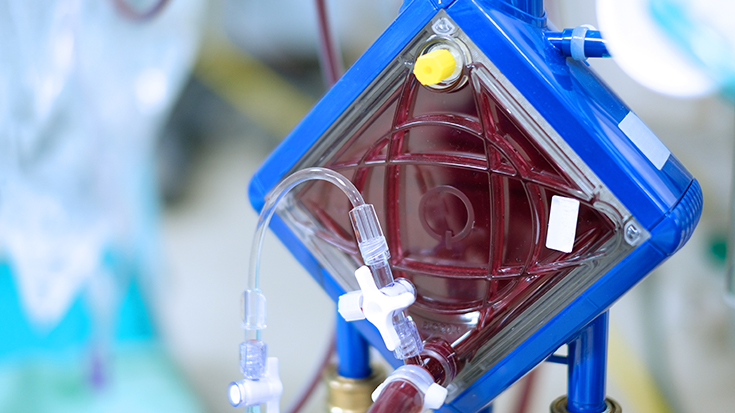
Extracorporeal membrane oxygenation (ECMO) is a last resort therapy designed to save the lives of children and adults who are running out of options for conventional treatment. Respiratory therapists are often tapped to serve as ECMO specialists, but working in this role requires extensive training and careful consideration of the psychosocial issues involved.
In this interview, John Priest, BSRT, RRT, RRT-NPS, an ECMO specialist II at Boston Children’s Hospital in Boston, MA, explains what it takes to assume the role.
How long have you been an RT and what led to your interest in serving on the ECMO team in your hospital?
I have been an RT for 12 years, the last eight as an ECMO specialist. What led me to become an ECMO specialist was the curiosity and interest to learn more and become more involved in my profession at a higher level. As far as patient profiles go, I have always had an interest in ARDS, congenital diaphragmatic hernia, and congenital heart defects. These patients provide a large number of ECMO runs, and the research and development in techniques and strategies have always been an interest of mine.
What educational, clinical, experience, and/or credentialing requirements did you have to meet to get the job as the ECMO specialist, and why do you think it is important for ECMO specialists to meet these requirements?
I currently hold a bachelor’s degree in respiratory therapy as well as the Registered Respiratory Therapist and Neonatal Pediatric Specialist credentials. We do not have an education requirement to become an ECMO specialist, but you do need to hold the RRT-NPS credential. You must meet our institution’s requirements of a respiratory therapist level II, then complete an in-house ECMO training program and all associated competencies. The training program encompasses a period of up to a year to complete, which establishes confidence with all bedside procedures, as well as transports and ECMO interventions.
It is important to meet these minimal requirements because being a level II respiratory therapist proves competence and proficiency of clinical and technical skills in all ICUs and patient care areas. The experience gained from transitioning from level I to level II further develops areas of interest and clinical specialties by involvement in Subject Matter Expert groups, ICU core teams, committees, and/or educational programs. This experience also develops strong communication skills, as well as leadership skills that will be required to excel as an ECMO specialist.
The ECMO training course consists of didactic lectures, water drills, simulations, and bedside time with an ECMO specialist. Water drills and high-fidelity simulation should
be a part of all training programs. This training style gives a great hands-on introduction to ECMO procedures and troubleshooting.
What are the major challenges and rewards of working as an ECMO specialist, and why?
ECMO can be both rewarding and disappointing. The total overall survival rate to discharge or transfer across all age groups — neonatal, pediatric, and adult — according to the Extracorporeal Life Support Organization, through 2020 is 54%. ECMO can be heartbreaking at times, but others can be rewarding and fulfilling.
There is a wide range of patient profiles and many different aspects that go into the care of an ECMO patient. These can include surgical procedures, diagnostic and prognostic procedures, anticoagulation, mechanical ventilation, etc. These strategies can change for each patient, which can make things challenging. The preparation you do with your training and knowledge base will prove the difference in meeting these challenges and making them successful.
What are your top bits of advice for any RT who might like to consider a job as an ECMO specialist and why?
- Never stop asking questions and learning.
- Preparation is very important. The time you put in for your education and the time you put in with water drills and simulation will only make you better and more efficient.
- This can be a stressful job at times, so make sure you take care of yourself.
- Accountability: The patients we take care of are some of the sickest in the hospital. Be accountable for them and to yourself; maintain your training and education in order to constantly provide the highest level of care.
- Choose a mentor, someone who you trust, and someone that can be honest. Long-term development and knowledge obtaining/sharing can be instrumental with the right mentor/mentee relationship.
- Communication: ECMO is multidisciplinary; it is imperative that communication is at a high level across all levels of care.





